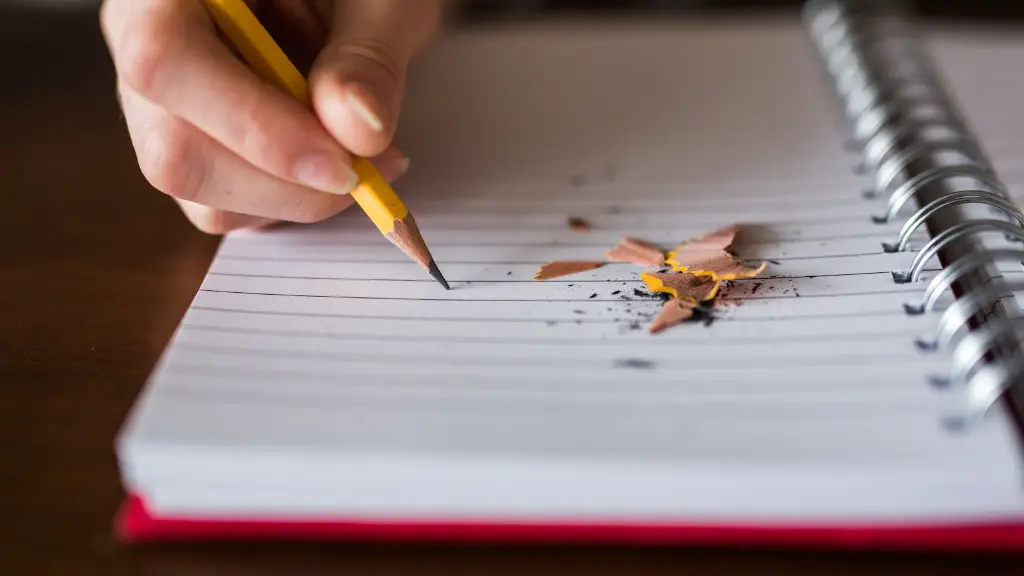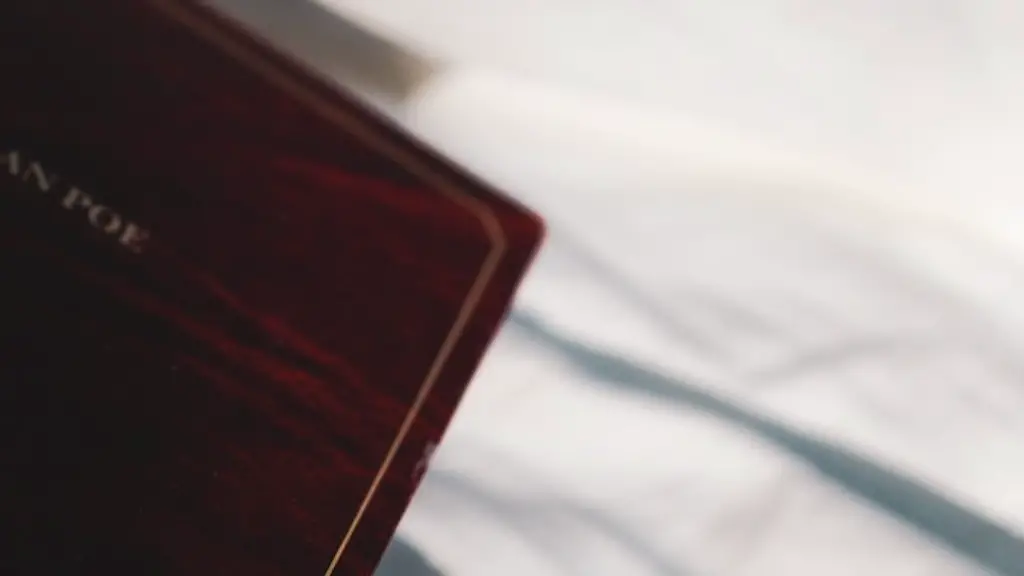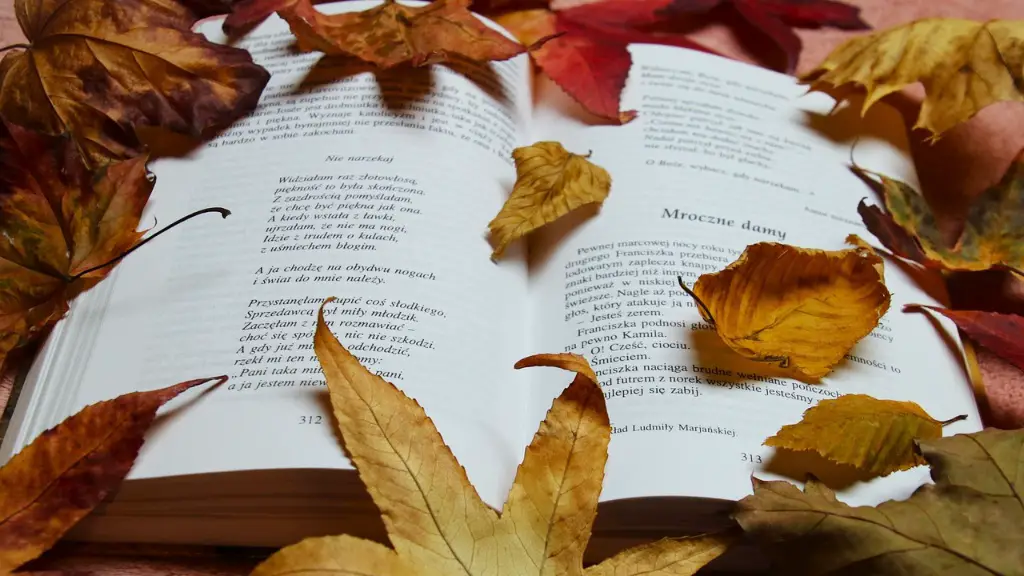Verse poetry is a literary form consisting of thoughtful and intricate language and emotions, making it a unique way of communicating. It is sometimes referred to as “lyrical”, as it is expressive, lyrical and often free-flowing. Verse poetry can be composed as a song or piece of music as well as a written text. Highly structured and styled, every line, phrase and stanza in a poetic piece can be full of multiple meanings and implications. What is great about verse poetry is that it is an art form that can be appreciated and interpreted in different ways, depending on its audience.
Verse poetry often uses rhyme and rhythm to create a certain effect. It is typically classified as either formal or informal depending on how its elements are put together. Formal verse poetry is usually written according to a specific structure or format and the rules of meter, rhythm, and rhyme are more strictly applied. On the other hand, informal verse is more free-flowing and looser in structure, allowing more versatility.
Verse poetry has been used as a form of expression throughout history. Poets have used it to highlight their views on a wide range of topics, such as war, love, and faith. It can also be used to make a social or political statement, or to evoke a particular emotion. It is a powerful tool of communication and can be used to get a point across in a unique and beautiful way.
Verse poetry is a great way for authors to express themselves and their feelings. It can also be used to share stories and to create a mood or atmosphere. The poet or author can use it to create a vivid and detailed image in the reader’s mind.
Understanding verse poetry can be a challenge. It requires a great degree of skill and understanding of language and its mechanics. In order to fully appreciate and engage with a poem, readers must be familiar with different literary forms and styles, and be able to recognize devices such as imagery, metaphor, and alliteration.
History of Verse Poetry
Verse poetry has been around for centuries and various cultures used the form to express their feelings, beliefs and experiences. Ancient Greek and Roman literature used verse poetry, as well as the ancient Chinese, Japanese and Persian cultures. Renaissance literature also featured magnificent works of verse poetry. In the modern era, there is a wide range of verse poetry styles, from postmodern to rap and spoken word.
Lyrical pieces of writing, like verses, shifted from a solely poetic mode of expression to a cultural one throughout history. Nowadays, we are surrounded by verse poetry in its various forms. Music and film have adopted the style and many songs use lyrics to express the emotion behind the composition. Alongside popular medias, traditional poetry such as iambic pentameter, sonnets and haikus, is still very much enjoyed and appreciated in day-to-day life.
Poetic Genres
Verse poetry can take many forms and come in a variety of genres. Some of the most popular poetic genres are: sonnet, epic poetry, lyric poetry, ballad, and haiku. Sonnets are probably the most well-known, with their specific rhyme scheme and fourteen lines of iambic pentameter. Ballads, on the other hand, are narrative poems usually telling a story, usually set to music and are popular in songs. Lyric poem is a poem that expresses the thoughts and feelings of the poet, often focusing on love, death, beauty and nature. Epic poetry is characterised by its length and grandiose subject matter, usually centred around an epic hero or mythic figures, recording their legendary exploits and adventures. And lastly, the haiku, originating from Japanese literature, is characterised by its short, three-verse structure and the use of specific syllable patterns such as 5-7-5.
Purpose of Verse Poetry
Verse poetry is a timeless form of literature that has been used since the dawn of time. It can be used to create imagery, appeal to readers’ emotions, and express ideas in a powerful way. It is a great way to communicate and share stories, as well as to reflect on the human condition. It has the power to engage people and to inspire them to think about the world in new ways.
At its core, verse poetry is about creative expression. It provides writers and readers with an intimate form of communication, allowing them to express their feelings, share stories, and question life in a creative and beautiful way.
Future of Verse Poetry
It is exciting to think of the future of verse poetry. With the evolution of culture and society, the style and form of the genre may continue to shift and evolve. As verse poetry is a form of communication, it stands to reason that its use as a tool of expression will continue to increase in the future.
Verse poetry has shaped our world and continues to influence our lives. We should continue to nurture and appreciate its power and beauty, while encouraging its use as a form of expression in our society.
Technological Implications
In the digital age, technology has made verse poetry more accessible than ever. By using the internet, people can share their poetry with a much larger audience. This has also allowed for a wider range of styles and formats to be used and explored. Additionally, new technologies have made it easier for people to record and share songs and music that incorporate verse poetry.
Moreover, technology has opened up new possibilities for poets. Online platforms and tools, such as mobile apps, provide writers with a wealth of resources to explore both their writing and the work of others. As we move into the future, technology can be expected to play an even bigger role in the form and content of verse poetry.
Education
Due to its complexity and intricacy, understanding and appreciating verse poetry can be a challenge, but it can also be a great learning opportunity. Students can benefit greatly from studying and exploring different styles, forms and genres of verse poetry and learn how to engage with poems in meaningful ways.
Learning about and being able to identify literary devices such as meter, rhyme, and imagery can also benefit students in a variety of subject areas, from history and literature to science and social studies. Understanding and appreciating verse poetry can lead to a greater understanding of language and its multiple implications.
Conclusion
Verse poetry is a timeless, intricate and powerful form of expression. It can be used to create vivid images in the mind of the reader and it is a great way to convey emotions and ideas. Despite evolving and adapting to the digital age, it has remained a beloved genre and can be used in a variety of ways. We should continue to nurture, appreciate and promote its beauty and power.




